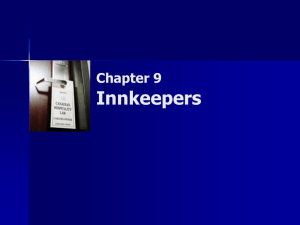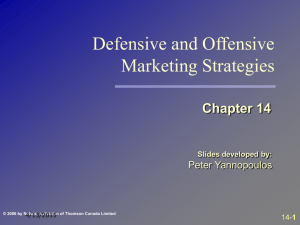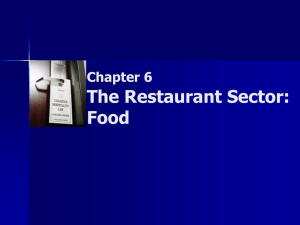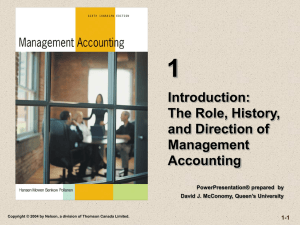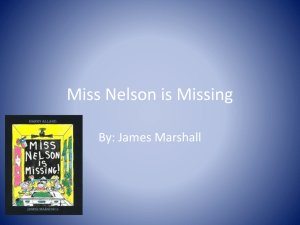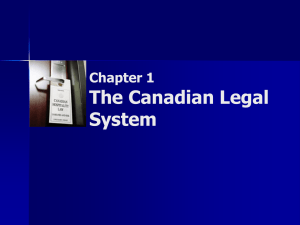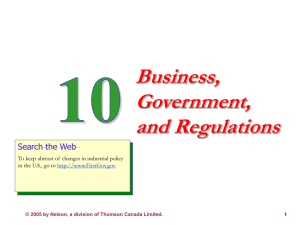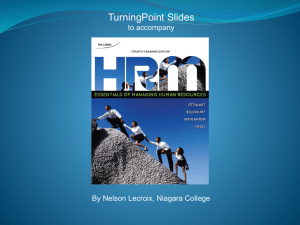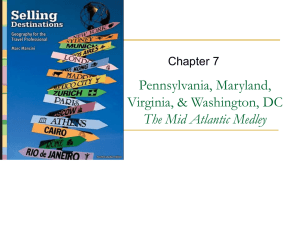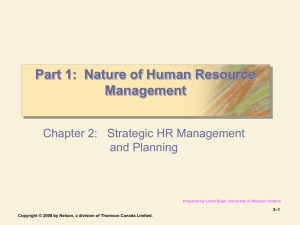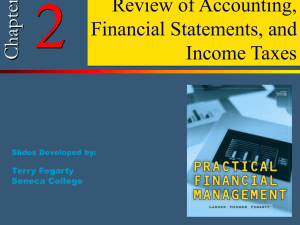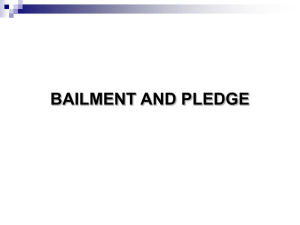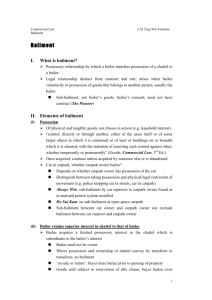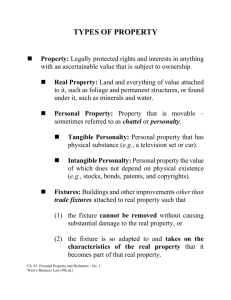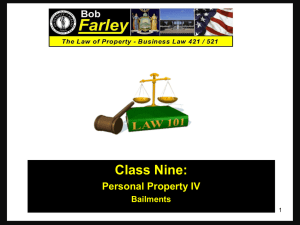Chapter 11 – Protection of Guests and Their Property
advertisement
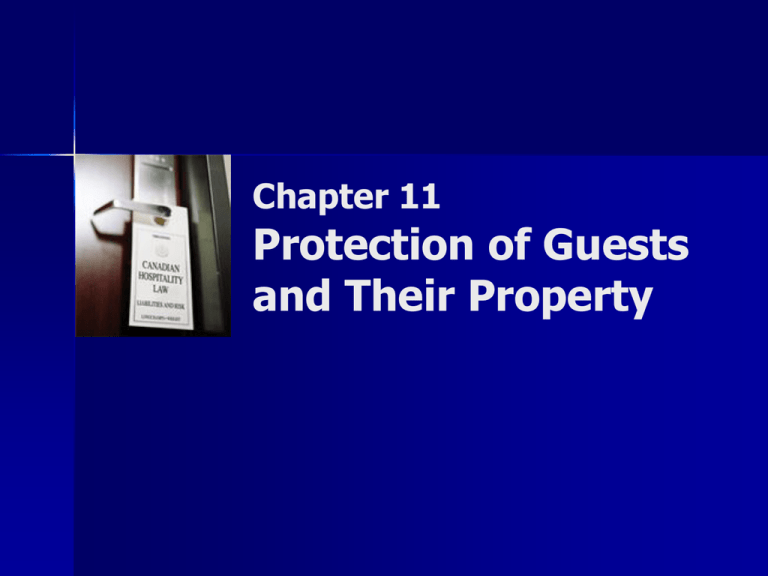
Chapter 11 Protection of Guests and Their Property Summary of Objectives To determine the liability of innkeepers for guest property and the role of insurance To examine the law of bailment as it applies to innkeepers Copyright © 2007 by Nelson, a division of Thomson Canada Limited 2 Introduction In medieval England, reivers and thieves created a high degree of risk for travellers. Innkeepers sometimes collaborated in these thefts. Common law judges consequently imposed on innkeepers absolute liability for the safety of guests and their property. Copyright © 2007 by Nelson, a division of Thomson Canada Limited 3 Absolute Liability Rule Under common law, if there is an innkeeper-guest relationship, and if the guest suffers a loss, the innkeeper is liable for it. Copyright © 2007 by Nelson, a division of Thomson Canada Limited 4 Absolute Liability Rule 2 When defining an innkeeper-guest relationship, it is important not to confuse the lesser duties owed by a restauranteur and landlord with the absolute liability of an innkeeper. Copyright © 2007 by Nelson, a division of Thomson Canada Limited 5 Exceptions to the Absolute Liability Rule The innkeeper will not be held absolutely liable if one of the following factors is involved in the guest’s loss: • The guest’s own negligence • Acts of public enemies • Acts of God Copyright © 2007 by Nelson, a division of Thomson Canada Limited 6 Infra Hospitium The term infra hospitium • means within or on the premises of the inn • includes a limousine belonging to the inn or engaged by the inn • includes stables, parking lots and garages Copyright © 2007 by Nelson, a division of Thomson Canada Limited 7 Statutory Limitations Legislation has been enacted to soften the harsh effect of absolute liability on innkeepers. Liability limits are set by posting a notice to guests as required by statute. Exceptions to the limit on liability occur upon the default, neglect or wilful act of an innkeeper or the innkeeper’s staff. Copyright © 2007 by Nelson, a division of Thomson Canada Limited 8 Disclosure of Value If a guest’s valuables or the amount of money to be stored is excessive, outside storage at a bank may be suggested. Whether the inn can refuse storage varies among provinces and territories. A secure vault and adequate insurance are important. Express deposit is required to create innkeeper liability for valuables stored in a vault. Copyright © 2007 by Nelson, a division of Thomson Canada Limited 9 Posting Requirements Innkeepers who fail to abide by the statutory posting of limited liability requirements will not be protected by the statute. Postings must be conspicuous and must include the amount of the limitation. Copyright © 2007 by Nelson, a division of Thomson Canada Limited 10 Seller’s Samples Liability of the innkeeper applies only to personal use items of the guest, unless the guest • notifies the hotel that samples are being brought in, and • provides the value of the samples. Copyright © 2007 by Nelson, a division of Thomson Canada Limited 11 Equitable Estoppel An innkeeper will be prevented from relying on the statutory limitation if the innkeeper or an employee assures the guest that • the hotel will be responsible for the full value of an item, or • there is no need to use the vault since the rooms are safe and secure. Copyright © 2007 by Nelson, a division of Thomson Canada Limited 12 Liened Property Guest property is liened when • an innkeeper holds the property for non payment of the guest’s account. • But, before the property can be sold, a notice of sale is required to be published in the local newspaper Copyright © 2007 by Nelson, a division of Thomson Canada Limited 13 Guest’s Conduct Negligence of a guest with respect to his or her property may reduce or eliminate the innkeeper’s liability. Failure to provide information at the time of an express deposit may also reduce or negate the liability of the hotel. Copyright © 2007 by Nelson, a division of Thomson Canada Limited 14 Categories of Property Left Behind by a Guest Lost property – a reasonable attempt to locate the guest must be made using registration card information Mislaid property – the owner placed the item in a special location, and then forgot it Abandoned property – the owner has given up ownership of the property Copyright © 2007 by Nelson, a division of Thomson Canada Limited 15 Access to the Guest’s Room Once a guest occupies a room, there are restrictions upon the rights of others based upon the guest’s • right to privacy, and • right to exclusive use of the room. Front desk clerks and switchboard operators should not reveal any guest information. Copyright © 2007 by Nelson, a division of Thomson Canada Limited 16 Insurance The following types of insurance are recommended for innkeepers: • Fire insurance • Theft insurance • Business interruption insurance • Public liability insurance Copyright © 2007 by Nelson, a division of Thomson Canada Limited 17 Property of Nonguests There is no innkeeper-guest duty with respect to the property of nonguests. The statutory limitation on liability of an innkeeper does not apply. Copyright © 2007 by Nelson, a division of Thomson Canada Limited 18 Bailment Bailment is the temporary transfer of possession (not title) of personal property from the bailor to the bailee. Copyright © 2007 by Nelson, a division of Thomson Canada Limited 19 Elements of Bailment Bailment applies only to personal property. The bailor transfers physical possession of the property. The bailee acknowledges receipt of the property. There is an express or implied agreement that the property will be returned to the bailor upon request. Copyright © 2007 by Nelson, a division of Thomson Canada Limited 20 Types of Bailment Bailment for the sole benefit of the bailor- gratuitous bailment Bailment for the sole benefit of the bailee Bailment for hire Copyright © 2007 by Nelson, a division of Thomson Canada Limited 21 Liability in Bailment Cases The bailor must establish • the property was delivered to the bailee • the bailee accepted it • the property was not returned or was damaged • the bailee breached the duty owed to the bailor Copyright © 2007 by Nelson, a division of Thomson Canada Limited 22
